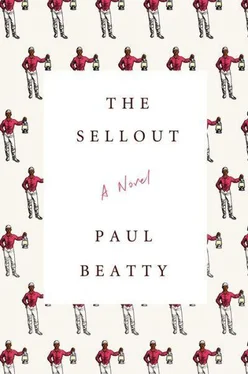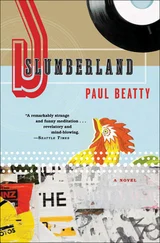Sometimes, when you’re high as I am, the line between thought and speech blurs, and judging by the way the black Justice is frothing at the mouth, I’ve said that last bit out loud, “… so fucking be it.” He stands up like he wants to fight. A wad of spit hocked from the deepest regions of his Yale Law School education chambered on the tip of his tongue. The Chief Justice calls out his name, and the black Justice catches himself and plops back into his chair. Swallowing his saliva, if not his pride. “Racial segregation? Slavery? Why you bitch-made motherfucker, I know goddamn well your parents raised you better than that! So let’s get this hanging party started!”
I suppose that’s exactly the problem — I wasn’t raised to know any better. My father was (Carl Jung, rest his soul) a social scientist of some renown. As the founder and, to my knowledge, sole practitioner of the field of Liberation Psychology, he liked to walk around the house, aka “the Skinner box,” in a laboratory coat. Where I, his gangly, absentminded black lab rat was homeschooled in strict accordance with Piaget’s theory of cognitive development. I wasn’t fed; I was presented with lukewarm appetitive stimuli. I wasn’t punished, but broken of my unconditioned reflexes. I wasn’t loved, but brought up in an atmosphere of calculated intimacy and intense levels of commitment.
We lived in Dickens, a ghetto community on the southern outskirts of Los Angeles, and as odd as it might sound, I grew up on a farm in the inner city. Founded in 1868, Dickens, like most California towns except for Irvine, which was established as a breeding ground for stupid, fat, ugly, white Republicans and the chihuahuas and East Asian refugees who love them, started out as an agrarian community. The city’s original charter stipulated that “Dickens shall remain free of Chinamen, Spanish of all shades, dialects, and hats, Frenchmen, redheads, city slickers, and unskilled Jews.” However, the founders, in their somewhat limited wisdom, also provided that the five hundred acres bordering the canal be forever zoned for something referred to as “residential agriculture,” and thus my neighborhood, a ten-square-block section of Dickens unofficially known as the Farms was born. You know when you’ve entered the Farms, because the city sidewalks, along with your rims, car stereo, nerve, and progressive voting record, will have vanished into air thick with the smell of cow manure and, if the wind is blowing the right direction — good weed. Grown men slowly pedal dirt bikes and fixies through streets clogged with gaggles and coveys of every type of farm bird from chickens to peacocks. They ride by with no hands, counting small stacks of bills, looking up just long enough to raise an inquisitive eyebrow and mouth: “Wassup? Q’vo?” Wagon wheels nailed to front-yard trees and fences lend the ranch-style houses a touch of pioneer authenticity that belies the fact that every window, entryway, and doggie door has more bars on it and padlocks than a prison commissary. Front porch senior citizens and eight-year-olds who’ve already seen it all sit on rickety lawn chairs whittling with switchblades, waiting for something to happen, as it always did.
For the twenty years I knew him, Dad had been the interim dean of the department of psychology at West Riverside Community College. For him, having grown up as a stable manager’s son on a small horse ranch in Lexington, Kentucky, farming was nostalgic. And when he came out west with a teaching position, the opportunity to live in a black community and breed horses was too good to pass up, even if he’d never really been able to afford the mortgage and the upkeep.
Maybe if he’d been a comparative psychologist, some of the horses and cows would’ve lived past the age of three and the tomatoes would’ve had fewer worms, but in his heart he was more interested in black liberty than in pest management and the well-being of the animal kingdom. And in his quest to unlock the keys to mental freedom, I was his Anna Freud, his little case study, and when he wasn’t teaching me how to ride, he was replicating famous social science experiments with me as both the control and the experimental group. Like any “primitive” Negro child lucky enough to reach the formal operational stage, I’ve come to realize that I had a shitty upbringing that I’ll never be able to live down.
I suppose if one takes into account the lack of an ethics committee to oversee my dad’s childrearing methodologies, the experiments started innocently enough. In the early part of the twentieth century, the behaviorists Watson and Rayner, in an attempt to prove that fear was a learned behavior, exposed nine-month-old “Little Albert” to neutral stimuli like white rats, monkeys, and sheaves of burned newsprint. Initially, the baby test subject was unperturbed by the series of simians, rodents, and flames, but after Watson repeatedly paired the rats with unconscionably loud noises, over time “Little Albert” developed a fear not only of white rats but of all things furry. When I was seven months, Pops placed objects like toy police cars, cold cans of Pabst Blue Ribbon, Richard Nixon campaign buttons, and a copy of The Economist in my bassinet, but instead of conditioning me with a deafening clang, I learned to be afraid of the presented stimuli because they were accompanied by him taking out the family.38 Special and firing several window-rattling rounds into the ceiling, while shouting, “Nigger, go back to Africa!” loud enough to make himself heard over the quadraphonic console stereo blasting “Sweet Home Alabama” in the living room. To this day I’ve never been able to sit through even the most mundane TV crime drama, I have a strange affinity for Neil Young, and whenever I have trouble sleeping, I don’t listen to recorded rainstorms or crashing waves but to the Watergate tapes.
Family lore has it that from ages one to four, he’d tied my right hand behind my back so I’d grow up to be left-handed, right-brained, and well-centered. I was eight when my father wanted to test the “bystander effect” as it applies to the “black community.” He replicated the infamous Kitty Genovese case with a prepubescent me standing in for the ill-fated Ms. Genovese, who, in 1964, was robbed, raped, and stabbed to death in the apathetic streets of New York, her plaintive Psychology 101 textbook cries for help ignored by dozens of onlookers and neighborhood residents. Hence, the “bystander effect”: the more people around to provide help, the less likely one is to receive help. Dad hypothesized that this didn’t apply to black people, a loving race whose very survival has been dependent on helping one another in times of need. So he made me stand on the busiest intersection in the neighborhood, dollar bills bursting from my pockets, the latest and shiniest electronic gadgetry jammed into my ear canals, a hip-hop heavy gold chain hanging from my neck, and, inexplicably, a set of custom-made carpeted Honda Civic floor mats draped over my forearm like a waiter’s towel, and as tears streamed from my eyes, my own father mugged me. He beat me down in front of a throng of bystanders, who didn’t stand by for long. The mugging wasn’t two punches to the face old when the people came, not to my aid, but to my father’s. Assisting him in my ass kicking, they happily joined in with flying elbows and television wrestling throws. One woman put me in a well-executed and, in retrospect, merciful, rear-naked chokehold. When I regained consciousness to see my father surveying her and the rest of my attackers, their faces still sweaty and chests still heaving from the efforts of their altruism, I imagined that, like mine, their ears were still ringing with my high-pitched screams and their frenzied laughter.
Читать дальше












